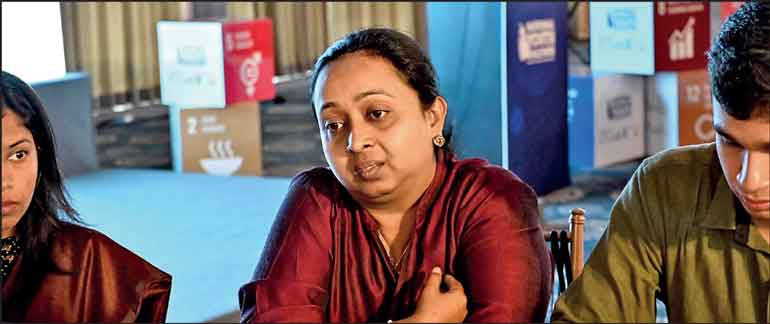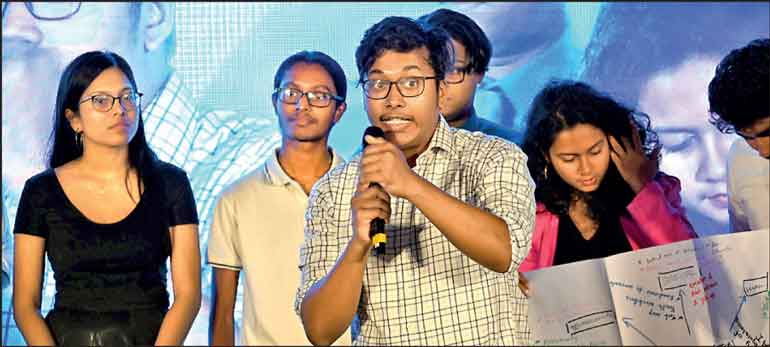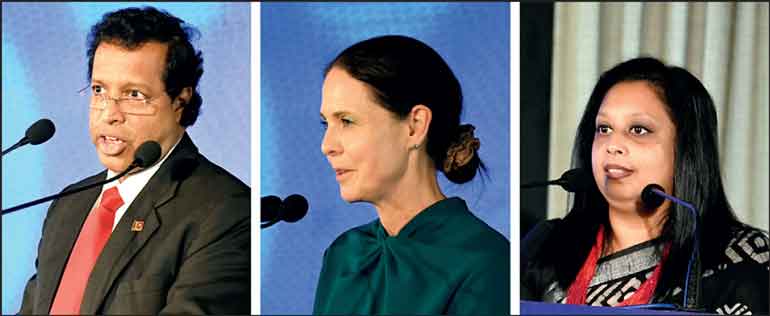Thursday Feb 26, 2026
Thursday Feb 26, 2026
Saturday, 11 January 2025 00:24 - - {{hitsCtrl.values.hits}}
 A group of participants of the Green Innovation Challenge, recognised at NYD 2024
A group of participants of the Green Innovation Challenge, recognised at NYD 2024
The Youth Co:Lab National Youth Dialogue for 2024 convened, marking a milestone event under the theme “Leadership, innovation and entrepreneurship”. It facilitated a consultative discourse on priorities of young people and existing gaps that hinder youth development, while recognising the achievements of young entrepreneurs from Sri Lanka. Led by the United Nations Development Program (UNDP) in Sri Lanka, the consultation highlighted the pivotal role of youth in tackling national and global challenges, with a focus on entrepreneurship.
Over 100 youth leaders, policymakers, entrepreneurs, and innovators across Sri Lanka collaborated to deliberate on pressing issues impacting young people, including barriers to youth participation in governance, the startup ecosystem, and effective action. Attendees explored solutions aimed at advancing sustainable development while emphasising the critical contributions of youth in driving innovation and resilience.
Reflecting on the outcomes of this year’s dialogue, UNDP in Sri Lanka Officer-in-Charge Malin Herwig shared, “The National Youth Dialogue has once again highlighted the transformative potential of Sri Lanka’s youth in driving innovation, entrepreneurship, and sustainable development. At UNDP, we are steadfast in our mission to empower young people by equipping them with the skills, tools, and opportunities to become leaders of change. As a regional initiative by Youth Co:Lab, co-led by UNDP and the Citi Foundation, and through flagship programs such as HackaDev, we are building a generation capable of addressing pressing challenges and driving impactful solutions. Together with the Government of Sri Lanka and our partners, we remain committed to fostering an inclusive ecosystem where the energy, creativity, and determination of our youth can shape a resilient and prosperous future for all.”

Consultation Sessions at NYD 2024

Participants presenting their ideas at NYD 2024

Pradeep Saputhanthri, Sec to the Prime Minister of lka; Malin Herwig, OIC UNDP & Shanaka Waduge, Head of Public Affairs, Citi Sri Lanka
In 2024, UNDP strategically prioritised institutional strengthening while continuing impactful programmatic interventions to empower youth and drive sustainable, system-level transformations. These efforts, supported financially by Youth Co:Lab, a co-initiative of UNDP and Citi Foundation, included the transformation of the National Youth Corps (NYC) Life Skills curriculum, benefiting over 10,000 youth annually, and capacity development for 200 Life Skills Instructors across 58 youth centres nationwide. Additionally, enhancements to the Small Enterprise Development Division’s (SEDD) processes have positively impacted 28,000 enterprises annually. The year also saw the successful completion of HackaDev initiatives, culminating with the National Youth Dialogue 2024.
UNDP Sri Lanka has been a steadfast advocate for empowering young people, leveraging platforms like HackaDev – UNDPs flagship social innovation platform, and the National Youth Dialogue to drive meaningful engagement. Since its inception in 2017, the National Youth Dialogue has become a flagship event, connecting with the regional Youth Co:Lab initiative to contribute to a dynamic network of youth-focused dialogues across Asia and the Pacific.
Secretary to the Prime Minister Pradeep Saputhanthri highlighted the Government’s commitment to youth empowerment noting, “As a representative of the Government, I firmly believe that true youth empowerment demands a collective effort. It necessitates strong partnerships that extend beyond Government, encompassing youth themselves, the private sector, civil society, development partners, and the international community. This is not merely a desirable aspiration; it is an imperative. We, as policymakers, corporate leaders, and development partners, bear the responsibility to act.”
Recognising the potential of Sri Lanka’s 5.125 million-strong youth population, participants underscored the necessity of fostering inclusive opportunities for leadership and entrepreneurship to address the country’s rising youth unemployment and climate vulnerabilities.
Youth Co:Lab, co-initiated by UNDP and the Citi Foundation, stands as the largest youth initiative in Asia and the Pacific focused on empowerment, social entrepreneurship, equality, and inclusion. Sri Lanka’s National Youth Dialogue is part of an annual series conducted across more than 20 countries in the region, complementing diverse programmatic efforts aimed at enhancing the leadership, innovation, and entrepreneurial skills of young people.
Commenting on this year’s focus, Citi Sri Lanka Head of Public Affairs Shanaka Waduge remarked, “We are honoured to have partnered with the Youth Co:Lab program alongside UNDP for the past seven years, fostering innovation, resilience, and entrepreneurship among Sri Lanka’s youth. This collaboration has empowered young leaders and innovators, resulting in over 50 enterprises and positively impacting thousands through self-employment, upskilling, and personal growth initiatives. We are deeply committed to cultivating a thriving and inclusive future, and the Youth Co:Lab National Youth Dialogue continues to be a transformative platform for amplifying youth voices and driving sustainable development.”
The dialogue sparked conversations on celebrating the successes of young leaders, innovators, and entrepreneurs; identifying challenges and opportunities for young people; generating momentum and partnerships for scaling up youth-led initiatives; and advocating for policies and programs that support youth development.
The event culminated in transformative outcomes, including recommendations to guide Sri Lanka’s future youth programming and forge dynamic partnerships to amplify youth-led initiatives. It ended with a powerful call to action, urging the adoption of policies that position young people as key drivers of a sustainable future.